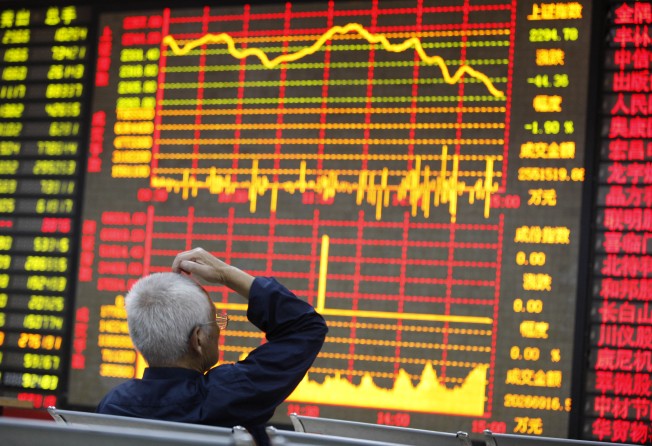Global equity markets too dependent on stimulus from Central Banks

If there was any doubt about the influence the world’s major central banks exert on investor sentiment, it will have been dispelled by the rapidity with which China’s benchmark equity index rebounded following last week’s sharp sell-off.
Following a dramatic decline of 6.5 per cent last Thursday - one of the steepest one-day falls over the past 15 years - the Shanghai Composite roared back, rising nearly 5 per cent on Monday as data revealed that China’s “official” purchasing managers’ index (PMI) for the non-manufacturing sector sank to its lowest level since December 2008, underscoring the severity of the slowdown in the country’s closely watched economy.
The weak PMI data buoyed sentiment in China’s equity markets in the latest example of the “bad news is good news” phenomenon in which investors treat negative economic developments as positive ones on the grounds that they make it more likely that central banks will provide further stimulus.
There is still plenty of bad, or at least mediocre, news for QE-driven equity bulls to latch on to.
The world economy is set to expand just 3.1 per cent this year, compared with an average yearly rate of nearly 4 per cent in the decade through to 2011, according to the Organisation for Economic Cooperation and Development (OECD).
Even the supposedly more buoyant US economy is expected to grow only 2 per cent this year (compared with an earlier forecast of 3 per cent) following an outright contraction in the first quarter.
Indeed the OECD, which unveiled its latest economic forecasts on Wednesday, now describes the eurozone as the “bright picture”, mainly because it is enjoying “effective policy action” on the part of the European Central Bank (ECB) which launched a programme of full-blown quantitative easing (QE) in March.
This has significantly increased the cumulative share of global GDP accounted for by countries whose central banks are easing monetary policy from less than 20 per cent in November to more than 50 per cent today, according to the OECD.
For equity investors, additional monetary stimulus at a time when global growth remains febrile and the US Federal Reserve is expected to start raising interest rates later this year is a powerful buy signal.
The facts speak for themselves.
The Euro Stoxx 50 Index, the main equity gauge in the eurozone, has risen 16.5 per cent this year while the Nikkei 225, its Japanese equivalent, is up more than 17 per cent mainly because of the export-boosting effects of a weak yen which have been underpinned by the Bank of Japan’s own QE programme.
Yet while equity investors may be taking their cue from the actions and signals of central banks, the disconnect between increasingly stretched valuations - Chinese stocks are deemed to have been in a bubble for some time now while the benchmark US S&P 500 index is currently trading at 17 times forward earnings, above its historical averages - and weak economic fundamentals is becoming more pronounced, questioning the underpinnings and sustainability of rallies.
In the US, a six-year-long bull run already seems to have run its course, with the S&P 500 up a meagre 2.7 per cent this year. With the US economy faltering, there are mounting concerns about the lack of earnings growth, with cost-cutting and share buybacks - as opposed to revenue growth - accounting for the bulk of earnings increases in recent years.
In the eurozone, meanwhile, while growth is picking up gradually and deflation has given way to subdued inflation, the threat of a Greek default and potential exit from the bloc continues to weigh on sentiment. Just as importantly, there are sharp divergences in economic performance. France’s manufacturing sector is still contracting while German manufacturing output sank to a five-month low in May, according to data provider Markit.
Yet despite these economic vulnerabilities, the French and German stock markets have surged 18 per cent and 16.5 per cent respectively this year, buoyed by the QE-driven weakening of the euro which is benefiting the bloc’s manufacturers.
China, however, is where the stakes are highest.
The Shanghai Composite is up a whopping 52 per cent this year - by far the world’s best-performing equity market - in the face of a sharp economic slowdown and mounting concerns about China’s shadow banking system and vulnerable property market.
While Janet Yellen, the Fed chairwoman, is at least warning that US equity valuations are “quite high”, Chinese policymakers are inflating the bubble by implementing a raft of pro-growth policies.
Punters betting on more stimulus measures may continue to make a killing. But the more prudent investors will treat last week’s sharp decline in Chinese stocks as a foretaste of things to come.
Nicholas Spiro is managing director of Spiro Sovereign Strategy